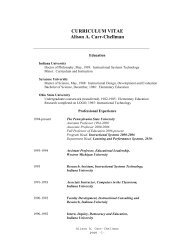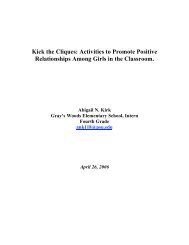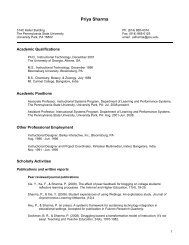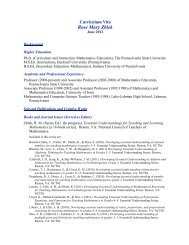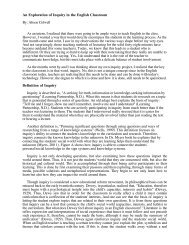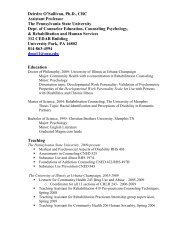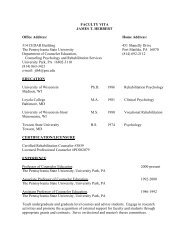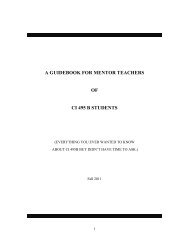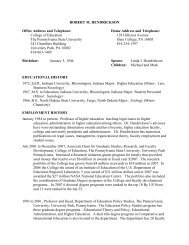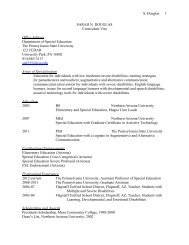Lets Focus! - the Penn State College of Education
Lets Focus! - the Penn State College of Education
Lets Focus! - the Penn State College of Education
Create successful ePaper yourself
Turn your PDF publications into a flip-book with our unique Google optimized e-Paper software.
"impaired ability to utilize social cues such as body language,<br />
irony, or o<strong>the</strong>r"subtext" <strong>of</strong> communication; restricted eye contact<br />
and socialization; limited range <strong>of</strong> encyclopedic interests;<br />
perseverative, odd behaviors; didactic, monotone voice; "concrete"<br />
thinking; over-sensitive to certain stimuli; and unusual movements"<br />
(http://www.pediatric neurology.com/newpage 11.htm).<br />
Fur<strong>the</strong>rmore, Sensory Integration Dysfunction is a co-morbid disorder associated<br />
with ADD/ADHD. This dysfunction is <strong>the</strong> "inability to process information received<br />
through <strong>the</strong> senses" (http://www.pediatricneurology.com/newpage 11.htm). With this<br />
disorder, <strong>the</strong> child may be undersensitive or oversensitive to stimuli. Because <strong>the</strong>re are<br />
many symptoms that mimic <strong>the</strong> symptoms associated with ADD/ADHD, Sensory<br />
Integration Dysfunction is usually evaluated by an occupational <strong>the</strong>rapist. Some <strong>of</strong> <strong>the</strong><br />
symptoms include:<br />
• Hypersensitive to touch: sensitive to clo<strong>the</strong>s or getting dirty; withdraw to light<br />
kiss.<br />
• Hyposensitive to touch: wallow in mud; rub against things; unaware <strong>of</strong> pain.<br />
• Hypersensitive to movement: avoid running, climbing or swinging.<br />
• Hyposensitive to movement: rocking; twirling; unusual positions.<br />
• May also respond abnormally to sights, sounds, smells, tastes or textures.<br />
• May be clumsy; have trouble coordinating (bilateral) movements; or have poor<br />
fine motor skills.<br />
What are <strong>the</strong> serious consequences <strong>of</strong> ADD/ADHD?<br />
Depression could be a serious consequence <strong>of</strong> ADD/ADHD. In fact, depression<br />
could occur in ten to thirty percent <strong>of</strong> children and forty-seven percent <strong>of</strong> adults.<br />
Symptoms <strong>of</strong> depression could include "loss <strong>of</strong> joy, sadness, pervasive irritability,<br />
withdrawal, self0critical outlook, and vegetative symptoms (abnormal sleep or appetite)"<br />
9



